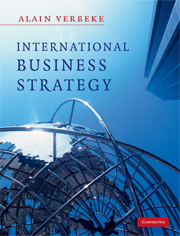Book contents
- Frontmatter
- Contents
- List of figures
- List of case studies
- About the author
- Foreword
- Acknowledgements
- List of abbreviations
- Walkthrough
- Introduction and overview of the book's framework
- Part I Core concepts
- Part II Functional issues
- Part III Dynamics of global strategy
- 11 Entry mode dynamics 1: foreign distributors
- 12 Entry mode dynamics 2: strategic alliance partners
- 13 Entry mode dynamics 3: mergers and acquisitions
- 14 The role of emerging economies
- 15A International strategies of corporate social responsibility
- 15B International strategies of corporate environmental sustainability
- Conclusion. The true foundations of global corporate success
- Appendix: Suggested additional readings
- Index
13 - Entry mode dynamics 3: mergers and acquisitions
from Part III - Dynamics of global strategy
- Frontmatter
- Contents
- List of figures
- List of case studies
- About the author
- Foreword
- Acknowledgements
- List of abbreviations
- Walkthrough
- Introduction and overview of the book's framework
- Part I Core concepts
- Part II Functional issues
- Part III Dynamics of global strategy
- 11 Entry mode dynamics 1: foreign distributors
- 12 Entry mode dynamics 2: strategic alliance partners
- 13 Entry mode dynamics 3: mergers and acquisitions
- 14 The role of emerging economies
- 15A International strategies of corporate social responsibility
- 15B International strategies of corporate environmental sustainability
- Conclusion. The true foundations of global corporate success
- Appendix: Suggested additional readings
- Index
Summary
This chapter examines Ghemawat and Ghadar's idea that global M&A transactions usually do not make economic sense. The authors note several management biases that lead to inefficient M&As, and they recommend several alternative strategies as superior to global M&As. These ideas will be examined and then criticized using the framework presented in Chapter 1.
Significance
Pankaj Ghemawat and Fariborz Ghadar wrote a classic HBR article in 2000, criticizing the observed trend towards international mergers and acquisitions (M&As), especially those among large MNEs from different regions of the world (the so-called ‘global mega-mergers’). Such M&As typically aim to create a company with a much wider geographic reach than that commanded by each partner individually.
Ghemawat and Ghadar ask whether such large-scale M&A transactions between MNEs, attempting to create firms with interregional or even worldwide market coverage, make economic sense. According to the authors, a general belief persists in many industries that increasing internationalization, in the sense of growing interdependence of markets in the world economy, will ultimately lead to industry consolidations whereby only a few large firms, commanding impressive scale economies, will survive. The obvious implication for senior managers is to get big in order to survive. This view is exemplified by the main strategy rule introduced at General Electric by former CEO Jack Welch. This rule, which still prevails in this highly diversified, US-based MNE, states that the firm should be active only in businesses where it can be the number one or two in the world in terms of size, and should divest businesses in which it cannot achieve that goal.
- Type
- Chapter
- Information
- International Business StrategyRethinking the Foundations of Global Corporate Success, pp. 339 - 358Publisher: Cambridge University PressPrint publication year: 2009

